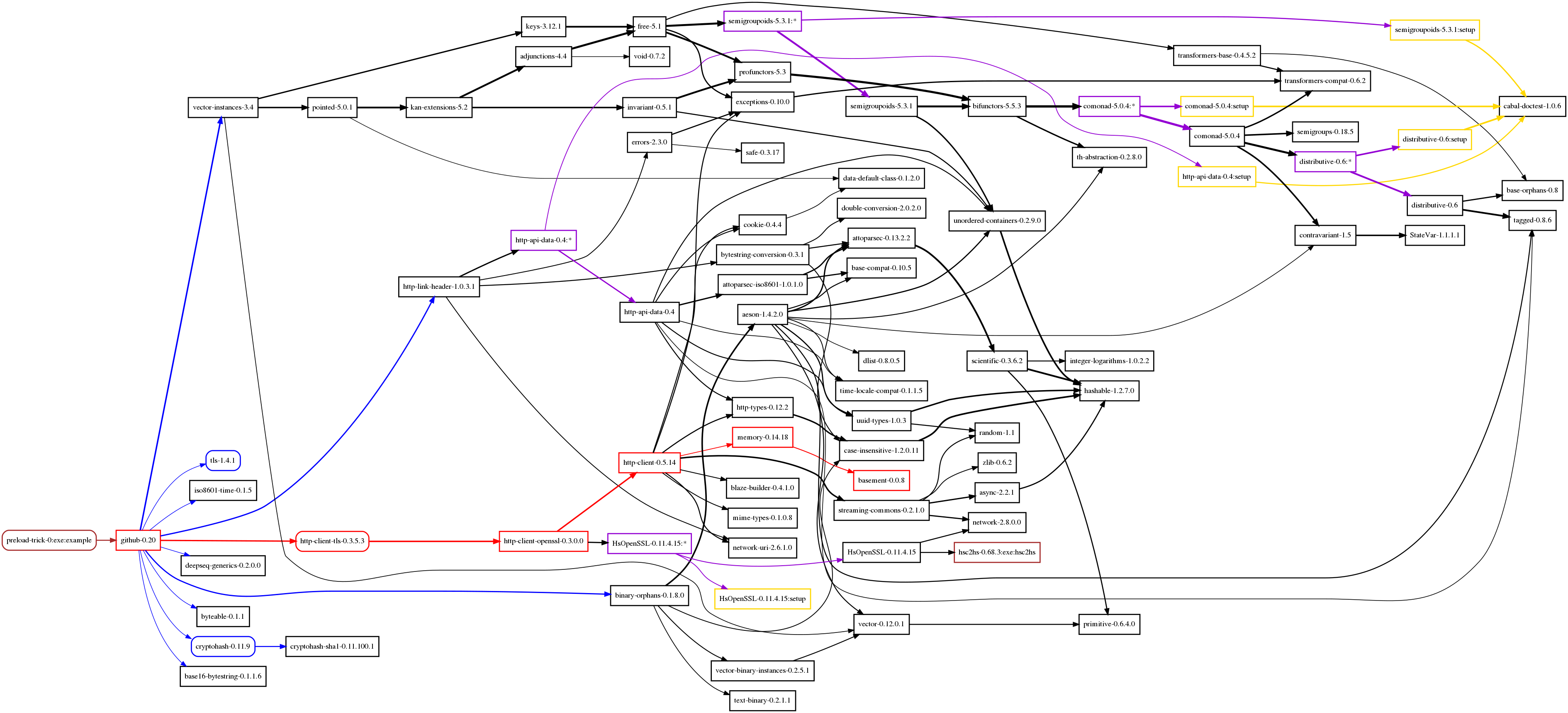Preload trick
This simple idea hit me when I was watching a talk about (dynamic) linking. On Linux (at least) we can LD_PRELOAD own shared objects, to override symbols in other (maybe even proprietrary) shared objects. This is useful for various purposes. Can we do something like that in Haskell?
Not exactly, Haskell is not C. But, as the ecosystem is open, we can simply vendor in the dependency (as source) and modify it. E.g. add some debug prints to figure out why something doesn't work as expected? We preload on the source level, i.e. use the local version of package, not the one on the Hackage.
However we don't need to stop there. We can mess with the vendored packages as much as we need to. Imagine that we want to use github package, but with HsOpenSSL for encryption, not the tls package.
There is a proof-of-concept implementation on GitHub phadej/preload-trick. The example program needs small adjustement, because every application that uses HsOpenSSL must wrap any operations involving OpenSSL with withOpenSSL:
{-# LANGUAGE CPP #-}
{-# LANGUAGE OverloadedStrings #-}
module Main (main) where
import qualified GitHub as GH
#ifdef MIN_VERSION_HsOpenSSL
import OpenSSL (withOpenSSL)
#else
withOpenSSL :: IO a -> IO a
withOpenSSL = id
#endif
main :: IO ()
main = withOpenSSL $ do
possibleUser <- GH.executeRequest' $ GH.userInfoForR "phadej"
print possibleUserThis example works out of the box with http-client-tls. It turns out that we need to mock only three packages, if we want to use HsOpenSSL:
http-client-tls: This is obvious.
http-client-tlsrelies ontlsfor TLS implementation. Luckilygithubuses onlytlsManagerSettingswhich can be implemented as oneliner usinghttp-client-openssl!module Network.HTTP.Client.TLS (tlsManagerSettings) where import Network.HTTP.Client (ManagerSettings) import Network.HTTP.Client.OpenSSL (opensslManagerSettings) import qualified OpenSSL.Session as OpenSSL tlsManagerSettings :: ManagerSettings tlsManagerSettings = opensslManagerSettings OpenSSL.contexttls: It turns out
githubdoesn't use anything fromtlsdirectly. The dependency definition exists there to forbid old versions oftls(git blamepoints to commit that originally addedtls >=1.3.5constrait. That version oftlshas Fix a bug with ECDHE based cipher where serialization, I don't remember whether that is important or not, better to be safe). Astlsisn't used, the mock package is an empty package (I specified a lot more than needed):cabal-version: 2.2 name: tls version: 1.4.1 synopsis: Example of "preload" trick category: Example, Development description: Mock some of @tls@. Actually none is needed license: BSD-3-Clause license-file: LICENSE author: Oleg Grenrus <oleg.grenrus@iki.fi> maintainer: Oleg Grenrus <oleg.grenrus@iki.fi> library default-language: Haskell2010 build-depends: , base ^>=4.11.1.0cryptohash: Here I can blame myself, somehow this (old) dependency sneaked in. I (as a maintainer of
github) should use much lightercryptohash-sha1package (orcryptonitedirectly, which I won't for this case).module Crypto.Hash (HMAC (..), SHA1, hmac) where import qualified Crypto.Hash.SHA1 as SHA1 import Data.ByteString (ByteString) data SHA1 newtype HMAC a = HMAC { hmacGetDigest :: ByteString } hmac :: ByteString -> ByteString -> HMAC SHA1 hmac secret payload = HMAC (SHA1.hmac secret payload)
All of the mocks are very simple, as we can see: github uses only a very small part of actual packages' APIs.
Is it worth it? Well... Maybe? At the very least, I learned about dependencies of github. It depends on cryptohash for no reason.
Also if you carefully inspect after dependency graph, you notice that http-client depends on memory! Looks like http-client uses Data.ByteString.Encoding to do Base64 encoding (in implementation of applyBasicAuth). I'd use base64-bytestring package for that purpose. So in this exercise we could mock memory also, to only provide the base64 encoding. Or patch http-client.
In some sense this trick is poor man's Backpack. Hopefully this trick would be useful for someone, or actually hopefully no one would ever need to rely on it.
#Dependency graphs
before

after

- 2025-02-13 – PHOAS to de Bruijn conversion
- 2025-02-11 – NbE PHOAS
- 2024-06-24 – hashable arch native
- 2024-05-28 – cabal fields
- 2024-04-21 – A note about coercions
 This work is licensed under a “CC BY SA 4.0” license.
This work is licensed under a “CC BY SA 4.0” license.